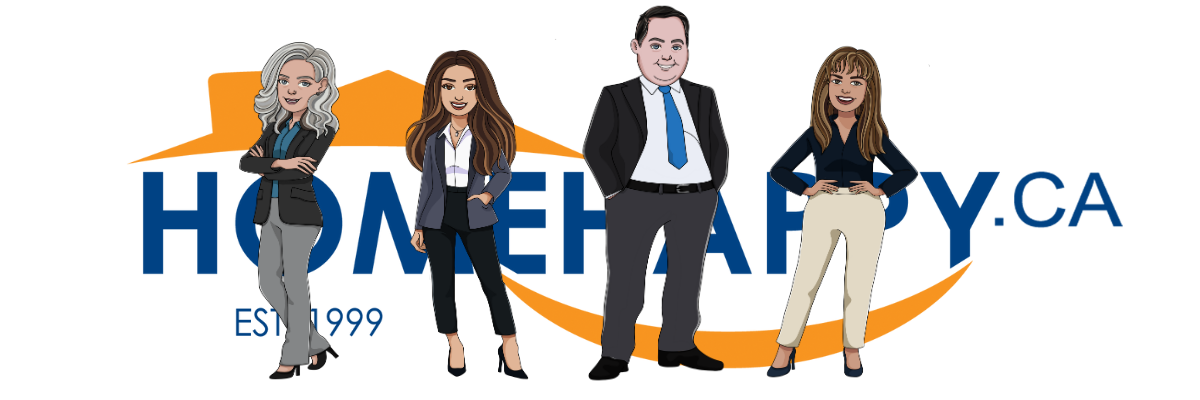Your 9 Essentials for Navigating Mortgages in Canada

Canadian winters can be icy, and we’d never brave the elements unprepared. So why wade into the complex world of mortgages and house hunting without arming yourself with the right knowledge?
The happiest homebuyers are well-educated, and we’re passionate about helping you know your options and make great choices.
Don’t get left in the cold.
Stay warm and informed — no matter the season — with these 9 need-to-know basics.
1. Credit Scores
Your credit score allows Lenders to evaluate your risk level as a borrower. In Canada, credit scores range between 300-900, and you unlock the best rates and terms with great credit.
What determines your score?
35% Payment History: How you’ve handled debt, and if payments are timely.- 30% Debt Owed: Credit utilization, and how reliant you are on non-cash funds.
- 15% Credit Account History: How long you’ve had credit.
- 10% New Credit: The number of recently opened accounts and hard inquiries.
- 10% Types of Credit: How many cards, loans, or lines of credit you have.
Lenders want to know that you’re a good, reliable investment. At minimum, they want to see two accounts with limits over $2,500, and two years of history.
No (or little) credit means there’s nothing to vouch for your ability to pay back the loan on time. In some ways, it’s worse than bad credit, because there’s nothing to speak for you. Right now is the best time to start building or improving your credit. Especially, If you’re looking to invest in property, or find a great home for you and your family.
If you want more information than we provide here, we encourage you to check out our articles on how to make your credit work for you, and
everything you need to know about credit.
2. Pre-Approval
House-hunt with confidence. Know what you can afford, and shop with a locked in interest rate for up to 120 days. Pre-approval can also unlock financial perks that save you money along the way.
Note: Speedy apps and pre-qualifying calculators are only estimates. They refer to
likely approval, but make no guarantees. Save time, stress, and rest assured by letting us vet and verify your information. We get guarantees, so you know how much you can borrow, and can find the best home for your needs.
3. Down Payments
In Canada, 5% of the property value is the minimum down payment. That being said, any down payment under 20% requires a home buyer to purchase mortgage default insurance (CMHC). Any one who can afford to pay 20% or more gains financial flexibility by avoiding the high insurance premium.
No matter your situation, we specialize at finding solutions, and strategies. If you have questions about your options, a quick (free!) consultation can help.
4. Closing Costs
Typically, you need between 2-4% of your home’s purchase price to cover the often overlooked fees that come with purchasing property.
We love transparency, so here’s some fees you can expect: land transfer tax, appraisal fees, legal fees, property tax, adjustments (strata and taxes), home inspection fees, title insurance/survey fee, home insurance, utility hook-ups, and moving expenses.
Our service is generally free, and we can help you prepare for and manage the financial obligations inherent in closing. So you can get right on to celebrating your new purchase!
5. Interest Rates
There are two mortgage products to consider when purchasing a home:
A
Fixed Mortgage Rate locks a buyer into a fixed rate for either a payment term (typically five years at a time) or for the length of their mortgage.
7 in 10 Canadians choose this option.
A
Variable Mortgage Rate is tied to a lender’s prime rate, so can be subject to change.
About 30% of Canadians choose this option.
If you’re curious, and want to know which option is best for you — we’ve done our homework (and it’s not cheating if you save time and leverage our expertise). If you want to do your own research, we have resources that can help you craft that awesome pros and cons list too.
6. Mortgage Types
Open Mortgages
Pay off your mortgage without penalty. Refinancing is more flexible. But, greater flexibility has a price tag, and these mortgages have higher rates than closed mortgages.
While prepayment can save thousands in interest by shortening the term of your mortgage product, this option isn’t best for everyone.
Closed Mortgages
Lower interest rates, but less flexibility. While many closed mortgages allow for some prepayment privileges, there is a limit for how much you can pay down.
Most Canadians go with a closed mortgage.
7. Mortgage Terms
A mortgage term is how long you’re locked in to your mortgage rate. It can range from 6 months to 5 years or more. When your term is up, you can re-evaluate your financial plan and renegotiate your mortgage product and terms. Even if that means changing lenders (sans penalty) to get the best deal and achieve your goals.
8. Mortgage Payments
In Canada, you have options. The most common frequencies are monthly, bi-monthly, bi-weekly, accelerated biweekly or every week. It’s important to choose a plan that fits your lifestyle and budget. The flexibility in repayment options can give you the opportunity to become mortgage free faster.
9. Mortgage Pay Back Time Period (Amortization)
The overall paid interest on your mortgage product is determined by the length of your pay back period. A longer amortization means you make smaller payments over a longer amount of time. In the short term you pay less, but your total paid interest will be significantly higher than if you went with a shorter amortization.
To shorten your payment plan, you can make additional payments — like when you receive a bonus or inheritance. Before you do, review your contract and check with your broker to avoid any penalties that may cheapen your extra deposit.
Reach out — journeys are better with friends. Your home buying expedition is no exception.
As always we’re here for you, whenever you need us.
We’re always happy to advise, and develop strategies that fit your unique needs. If you have any questions, please contact us for more customized information.
Consulting with a trusted Mortgage Broker, saves you time, energy, and money. Our services are free, and we advocate for you every step of the way.
We make a complex process as hassle-free as can be.
Share:
Recent Posts








